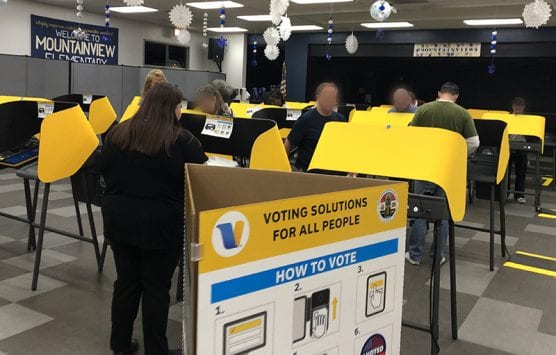By Alan Riquelmy
SACRAMENTO, Calif. (CN) — A bill that would allow California poll workers and voters to sue over election intimidation is advancing through the Legislature after a Wednesday vote.
The Assembly Elections Committee passed Assembly Bill 2642 — written by California State Assemblyman Marc Berman, D-Menlo Park. Called the PEACE Act, it now heads to that chamber’s Judiciary Committee.
A member of the Elections Committee, Berman said his bill would add civil protections for voters and poll workers.
“This bill is a continuation of California’s pro-democracy efforts,” Berman said.
Current law restricts firearms at polling sites. However, according to Robyn Sanders of the Brennen Center for Justice, there’s little people can do if law enforcement opts against enforcing that law.
Berman’s bill would give people the ability to sue and seek damages if they’re threatened.
Dora Rose, deputy director of the League of Women Voters of California, said that both democracies and dictatorships have elections. What makes a democracy’s election different is that it’s free from threats and intimidation, and people vote without fear.
“But that’s beginning to shift,” Rose warned. “Some people don’t feel safe at the voting places.”
According to Rose, many minorities and youth are among those who don’t feel safe while voting. Rose said that fear has its roots in Jim Crow — a system mainly in the South that treated Black and brown people as second-class citizens.
Rose noted that a large number of California elections officials have left their jobs since the 2020 election. Forty-four percent of California voters have a new election administrator for the upcoming general election.
Some Republicans on the Elections Committee raised transparency concerns over the bill.
California State Assemblyman Tom Lackey, R-Palmdale, said he supports the idea of protections for elections workers. However, he argued that a democracy encourages transparency. He worried that a government worker might sue over someone filing a public records request.
Berman said it must be proved that the act was intimidating. Lackey wasn’t convinced.
“I just think that’s a dangerous distinction and I don’t know where you draw the line,” Lackey said.
According to the author of a bill analysis, some Shasta County residents who grew angry over unproven voter fraud crowded around election workers as they worked, “bombarded” them with public records requests and called themselves an official task force when they visited people’s homes.
In Nevada County, a top elections worker got a restraining order against people who forced their way into her office, assaulting a staff member, the analysis author wrote.
California State Assemblyman Bill Essayli, R-Corona, questioned whether intent is required to trigger a violation, or if merely the perception of an election worker is all that’s needed. Essayli also asked for examples of people facing intimidation at California polls.
“I think everything you’ve described is already illegal,” Essayli said. “I am very worried about the First Amendment, addressing your government for a redress of grievances.” He said the bill could weaponize government workers against people.
Sanders said that while certain intimidation is a criminal act, there currently is no civil remedy for it. Berman’s bill gives people that option to sue.
She added that while she had no specific examples of intimidation, there is historical evidence of it and documented history of law enforcement not enforcing the law.
California State Assemblywoman Akilah Weber, D-La Mesa, who is also a committee member, said she’s seen a “troubling” trend across the country of intimidation that’s affected people’s right to vote. She added that she makes a point of taking her children to the polls on election day to impart its importance.
California State Assemblywoman Gail Pellerin, D-Santa Cruz, said Berman’s bill would create crucial protections and enable people to sue for civil damages. Pellerin, who is also a committee member, said she’d support the bill.
Like this:
Like Loading...
Related





 Tweet This
Tweet This Facebook
Facebook Digg This
Digg This Bookmark
Bookmark Stumble
Stumble RSS
RSS


























REAL NAMES ONLY: All posters must use their real individual or business name. This applies equally to Twitter account holders who use a nickname.
0 Comments
You can be the first one to leave a comment.